While researching the history of a house for a magazine column, I stumbled across a fascinating piece of history. It was the 1911 census return for No.93 Oakley Street in Chelsea, but instead of the usual list of former occupants, the enumerator was forced to note that ‘Suffragettes refused all information’.
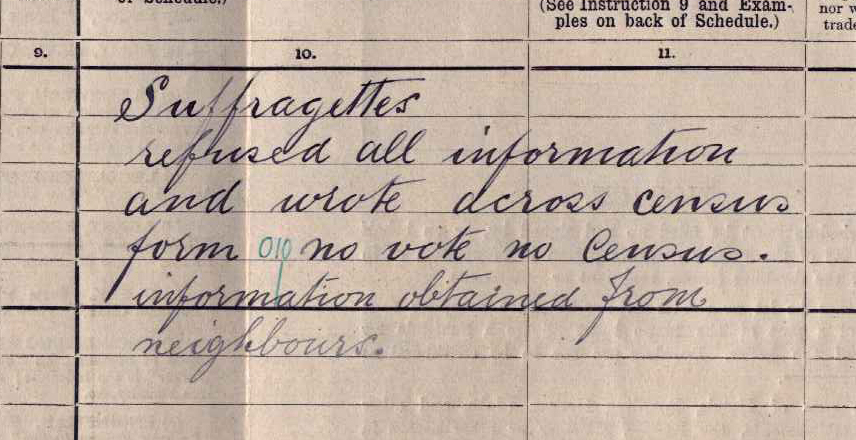
The enumerator further notes that the lady of the house had written across the original census return ‘no vote no census’. This one document (found by accident) brought to life a period of history from 100 years ago, which has had an extraordinary affect on history, but also on our lives today – the right for women to vote! It also raised a number of questions about who were these women of Oakley Street and what was their story?
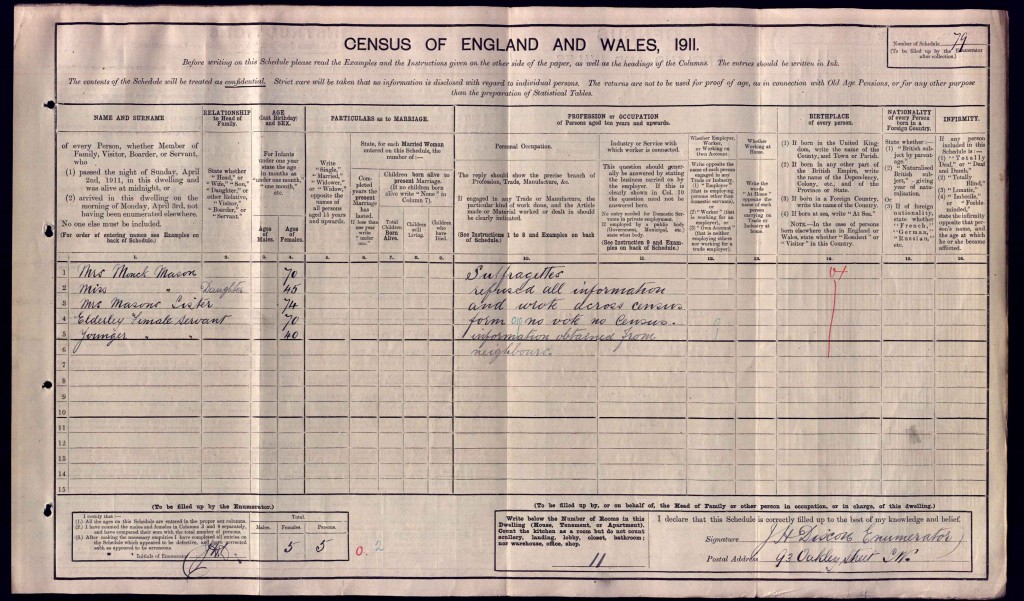
You’ll also notice that the enumerator has stated that information was gained from the neighbour. This included the name of the woman of the house ‘Mrs Monck Mason’, along with her daughter and sister, as well as an ‘elderly domestic servant’ and a ‘younger domestic servant’.
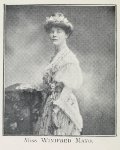
With the help of Naomi Paxton, I discovered the lady of the house was Mrs Alice Monck Mason and her daughter, Winifred Alice Monck Mason, an actress who went by the name of Winifred Mayo (the image to the left courtesy of thesuffragettes.org). Mrs Monck Mason (nee Alice Portia Wolley) was actively involved in the Suffragette movement, but it was her daughter, Winifred Mayo, who took on a key role in the political and militant fight for ‘Votes for Women’. Delving into the story of Winifred Mayo it became clear that she played an extraordinary role in the right for women to vote, as well as other organisations that fought for equal rights for women and men.
Winifred Monck Mason (Mayo) was born in India in c.1869, but returned to England for her Education. In the late 19th and early 20th century, she was performing on the stage in a variety of plays and productions, including as Elizabeth Bennett in The Bennetts at the Court Theatre in 1901. But, it was a few years later she took on a more important role in the suffragette movement.
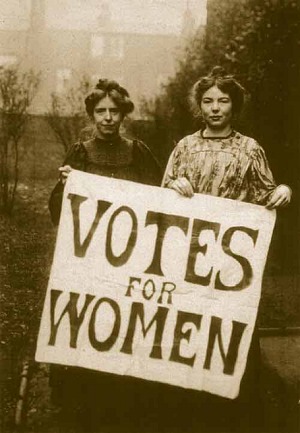
Winifred Mayo first became involved in the women’s suffrage movement in 1907 when she and her mother joined the Kensington branch of the Women’s Social and Political Union (WSPU). Winifred became actively involved in the militant side of the Suffragette movement and was first sentenced to imprisonment in 1908 for taking part in a demonstration at the House of Commons. She was arrested again in 1909 and 1910, but on these occasions was released without charge.
In 1908 Winifred Mayo founded the Actresses’ Franchise League (AFL) with other actresses, including Adeline Bourne. The AFL put on several performances to raise awareness of the women’s suffrage movement, and Winifred Mayo also assisted in training women in public speaking and performance. The AFL included a number of famous names, including Ellen Terry, Sybil Thorndike, Lilly Langtry, and many others. The AFL also advised fellow suffragettes in make-up and dressing-up “which enabled many women ‘on the run’ from the police to successfully disguise themselves and elude recapture.”
Her involvement in the suffrage movement brought Winifred Mayo in direct contact with Emmeline Pankhurst and her daughter, Christabel, along with a number of noted women. She later described her ‘tremendous admiration and affection for [Mrs Pankhurst]’.
Winifred Mayo was also involved in the window-smashing campaign and in November 1911 was imprisoned for three weeks for smashing the windows of the Guards Club in Pall Mall. She tells the story of the event in a radio interview with BBC many years later – it’s a short snippet but fantastic to hear the story in her own words! Listen here – ‘A smashing time in Pall Mall’
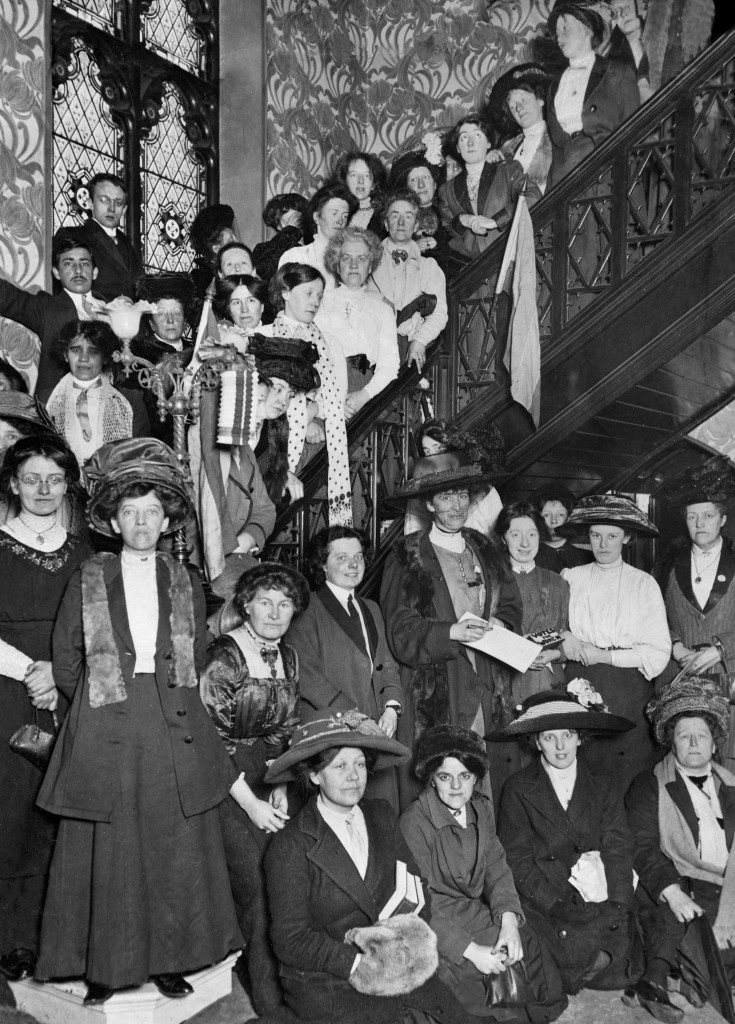
By the time the census was being taken on 2 April 1911, the campaign for ‘Votes for Women’ was growing and there was a specific campaign to boycott the census by many Suffragettes (although, interestingly there were many who disagreed with the boycott). Across the country there were a great many who planned events and parties to avoid completing the census return.
In London, there were a number of events, but the most well-known was a large gathering, estimated at around 500 women and 70 men. The event began with music in Trafalgar Square, but later the group spent the evening at the Aldwych ice skating rink (near to where London School of Economics is situated today). Winifred Mayo was known to be part of the Aldwych group and even provided some of the entertainment with members of the Actresses’ Franchise League performing recitals of Suffragist poems. At around 3.30am the group relocated to a restaurant towards Covent Garden for refreshment.
There is far more to the story of the ‘avoiders’ and ‘boycotters’ of the 1911 census, so if you want to know more, check the book ‘Vanishing for the Vote’ by Jill Liddington. More can be found from the blog by Elizabeth Crawford – Women and her sphere (including a fascinating lecture given at the House of Commons (although it is an hour long – House of Commons lecture) – as well as the website of Professor Jill Liddington – here.
Winifred Mayo went on to have an extraordinary life, involved in many campaigns for supporting women, as well as equal rights for all. She passed away at the age of 97 in February 1967.
This one discovery of an entry in the 1911 census reveals the extraordinary history, not only personal but national and international history, that can be uncovered when researching the history of houses.

